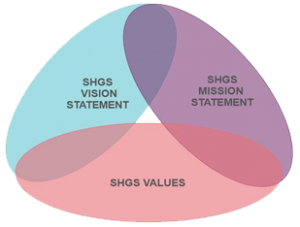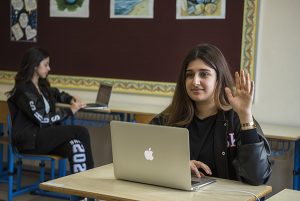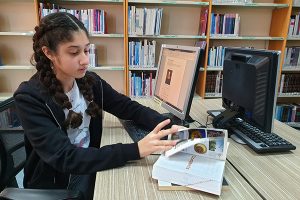INTRODUCTION
Shaikha Hessa Girls’ School (SHGS) is a national, private, and non-profit school that offers a bilingual education in Arabic and in English from Pre-school to Grade 12. This is in addition to French as a foreign language from Gr 4 to Gr8. The school is committed to providing high-quality education that fosters students’ personal, social, intellectual, physical, and aesthetic areas of development. Each individual student is provided with the support needed and is challenged to reach her full potential. To help our students meet the growing challenges, we optimize their learning opportunities through a wide range of extracurricular and after-school activities. In SHGS, we adopt the IB learner profile traits as school values for all students and staff to be Inquirers, Knowledgeable, Thinkers, Communicators, Principled, Open-Minded, Caring, Risk-Takers, Balanced and Reflective. While developing such attributes in our students, we encourage that Islamic and Arabic cultural values together with global citizenship are embedded in all aspects of our students’ school life, and in the larger community.
In SHGS, all stakeholders adhere to the school guiding statements and implement them to enhance the school’s performance and success.

SCHOOL VISION
“TOWARDS A BETTER FUTURE”
SCHOOL MISSION
To promote 21st century learners in a secure, healthy, all female environment by providing quality international education to achieve students’ potential as global citizens with emphasis on Arabic and Islamic values, fostering a commitment to sustainability in an effective joint home-school partnership.
SCHOOL MOTTO
“REACH FOR SUCCESS”
SCHOOL VALUES
All members of the SHGS community strive to be:

Inquirers-They develops their natural curiosity. They acquire the skills necessary to conduct inquiry and research and show independence in learning.
They actively enjoy learning and this love of learning will be sustained throughout their lives.
Knowledgeable–They explore concepts, ideas and issues that have local and global significance. In doing so, they acquire in-depth knowledge and develop understanding across a broad and balanced range of disciplines.
Thinkers–They exercise initiative in applying thinking skills critically and creatively to recognize and approach complex problems and make reasoned, ethical decisions.
Communicators–They understand and express ideas and information confidently and creatively in more than one language and in a variety of modes of communication. They work effectively and willingly in collaboration with others.
Principled–They act with integrity and honesty, with a strong sense of fairness, justice, and respect for the dignity of the individual, groups and communities. They take responsibility for their own actions and the consequences that accompany them.
Open-minded–They understand and appreciate their own cultures and personal histories, and are open to the perspectives, values and traditions of other individuals and communities. They are accustomed to seeking and evaluating a range of points of views and are willing to grow from the experience.
Caring–They show empathy, compassion and respect towards the needs and feelings of others. They have a personal commitment to service, and act to make a positive difference to the lives of others and to the environment.
Risk-takers–They approach unfamiliar situations and uncertainty with courage and forethought and have the independence of spirit to explore new roles, ideas, and strategies. They are brave and articulate in defending their beliefs.
Balanced–They understand the importance of intellectual, physical, and emotional balance to achieve personal well-being for themselves and others.
Reflective–They consider their own learning and experience. They can assess and understand their strengths and limitations to support their learning and personal development.
High-quality Learning
The definition of high-quality learning is created in a consultative way and we believe that it takes place when:
“individual students are actively engaged in their learning experience and empowered to demonstrate the 21st-century learner attributes as self-directed, confident individuals, active contributors, and responsible citizens.”
Intercultural Learning and Global Citizenship
SHGS identifies global citizens as those who “Care for themselves, others and their environment, respect and celebrate similarities and differences among people and cultures. They also demonstrate leadership skills and are aware of local and global issues and contribute innovatively to resolve them. they participate in service-learning aiming to implement necessary action and creative solutions locally and globally.”
Digital Citizenship at SHGS
We aim to equip students with the skills and knowledge they will need to thrive in a dynamic future, within and beyond SHGS. We expect our students to:
- Engage in a self-motivated process of lifelong learning in accessing changing technologies in preparation for a dynamic future.
 Consider their own rights and responsibilities in engaging positively, competently, and critically with digital technologies
Consider their own rights and responsibilities in engaging positively, competently, and critically with digital technologies- Develop the use of key skills, including literacy and communication, along with security, safety, and health and wellness aspects, with the aim of using of digital resources independently.
- Participate and communicate actively, respectfully, responsibly, and ethically at all levels in the digital environment.
- Become discerning and skilled in selecting reliable, quality, digital resources to support their own self-identified learning needs.

 Consider their own rights and responsibilities in engaging positively, competently, and critically with digital technologies
Consider their own rights and responsibilities in engaging positively, competently, and critically with digital technologies